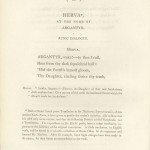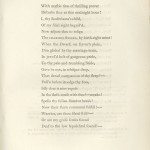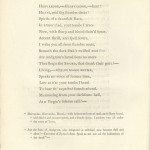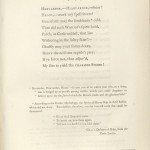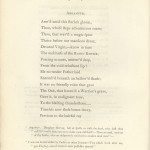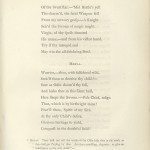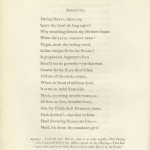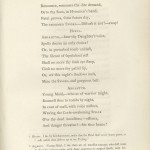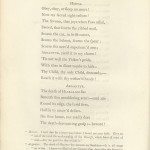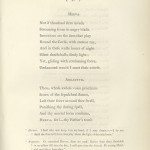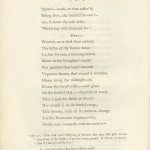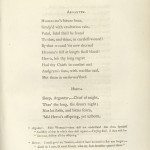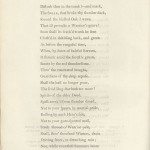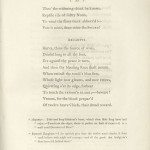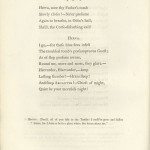Herva at the Tomb of Argantyr by Anna Seward
[from “Llangollen Vale with Other Poems”]
(22)
HERVA*,
AT THE TOMB OF
ARGANTYR
A
RUNIC DIALOGUE
HERVA.
ARGANTYR, wake!—to thee I call,
Hear from thy dark sepulchral hall!
‘Mid the Forest’s inmost gloom,
Thy Daughter, circling thrice thy tomb,
Hervor. “Awake, Argantyr!—Hervor, the Daughter of thee and Sauferlama, doth awaken thee! Give me out of the tomb the hardened sword which the Dwarfs made for Sauferlama.”
*Doctor Hick’s literal prose Translation in his Thesaurus Septentrionalis, of this ancient Norse Poem, is here given to gratify the reader’s curiosity; also to show that it is used only as an outline, and that the following Poem is a bold Paraphrase, not a Translation. The expressions in Dr. Hick’s prose, have a vulgar familiarity, injurious to the sublimity of the original conception. A close translation, in English verse, will be found in a valuable collection of Runic Odes, by the ingenious and learned Mr. Mathias. After his example, some slight changes have been made in the names, for their better accommodation to the verse.
(23)
With mystic rites of thrilling power
Disturbs thee at this midnight hour!
I, thy Sauferlama’s child,
Of my filial right beguil’d
Now adjure thee to resign
The CHARMED SWORD, by birth-right mine!
When the Dwarf, on Eyvor’s plain,
Dim glided by thy marriage-train,
In jewel’d belt of gorgeous pride,
To thy pale and trembling Bride,
Gave he not, in whisper deep,
That dread companion of thy sleep?—
Fall’n before its edge thy foes,
Idly does it now repose
In the dark tomb with thee?—awake!
Spells thy sullen slumber break!
Now their stern command fulfill!—
Warrior, art thou silent still?—
Or are my gross senses found
Deaf to the low sepulchral sound?—
(24)
HERVARDOR,—HIARVARDOR, —hear!
HRANI, mid thy slumber drear!
Spirits of a dauntless Race,
In armor clad, your tombs I trace.
Now, with sharp and blood-stain’d spear,
Accent shrill, and spell severe,
I wake you all from slumber mute,
Beneath the dark Oak’s twisted root!—
And Andgrym’s hated Sons no more
That sleeps the SWORD, that drank their gore?—
Living,—why, to MAGIC RHYME,
Speaks no voice of former time,
Low as o’er your tombs I bend
To hear th’ expected sounds ascend,
Murmuring from your darksome hall,
At a Virgin’s solemn call?—
“Hervardur, Hiarvardur, Hrani,—with helmet and coat of mail, and a sharp sword,
“with shield and accoutrements, and a bloody spear, I awaken you all under
“the roots of Trees.
“Are the Sons of Andgrym, who delighted in mischief, now become dust and
“ashes?—Can none of Eyvor’s Sons speak to me out of the habitations of
“the dead?”—
(25)
HERVARDOR,—HIARVARDOR,—hear!
HRANI,—mark my spell severe!
Henceforth may the semblance* cold,
That did each Warrior’s spirit hold,
Parch, as Corse unblest, that lies
Withering in the sultry skies!—
Ghastly may your forms decay,
Hence the noisome reptile’s prey,
If ye force not, thus adjur’d,
My Sire to yield the CHARMED SWORD!
“Hervardur, Hiarvardur, Hrani!—so may you all be within your ribs, as a thing
“that is hanged up to putrify among insects, unless you cause Argantyr to
“deliver up to me the sword which the Dwarfs made, and the glorious belt!”
*According to the Gothic Mythology, the spirits of Heros slept in their bodies, which did not decay. Putrefaction, therefore, was the heaviest curse that could be denounced.
“Never shall Enquirer come
“To break my iron-sleep again
“Till Lok has burst his ten-fold chain.”
GRAY’S Descent of Odin, from the Norse Poetry.
(26)
ARGANTYR.
Arm’d amid this starless gloom,
Thou, whose steps adventurous roam;
Thou, that wav’st a magic spear
Thrice before our mansions drear,
Devoted Virgin,—know in time
The mischiefs of the RUNIC RHYME,
Forcing accents, mutter’d deep,
From the cold reluctant lip!
Me no tender Father laid
Entomb’d beneath an hallow’d shade;
It was no friendly voice that gave
The Oak, that screen’d a Warrior’s grave,
Gave it, in malignant tone,
To the blasting thunderstone.—
Timeless now these bones decay,
Pervious to the baleful ray
“Aargantyr. Daughter Hervor, full of spells to raise the dead, why dost thou
“call so?—wilt thou run on to thine own mischief?—Thou art mad, and out
“of thy senses, who art desperately resolved to awaken dead men!”—
“I was not buried either by Father or Friends—Two which lived after me,
“got Turfing, one of whom is now possessor thereof,”
(27)
Of the swart star.—‘Mid Battle’s yell
The charm’d, the fatal Weapon fell
From my unwary grasp.—A Knight
Seiz’d the SWORD of magic might.
Virgin, of thy spells demand
His name,—and form his victor hand,
Try if thy intrepid zeal
May win the all-subduing Steel.
HERVA.
Warrior,—thus, with falsehood wild,
Seek’st thou to deceive thy child?—
Sure as Odin doom’d thy fall,
And hides thee in this silent hall,
Here sleeps the SWORD.—Pale Chief, resign
That, which is by birthright mine!
Fear’st thou, Spirit of my Sire,
At the only Child’s desire,
Glorious heritage to yield,
Conquest in the deathful field?
“Hervor. Thou dost not tell the truth—so let Odin hide thee in the tomb, as
“thou hast got Turfing by thee. Art thou unwilling, Argantyr, to give an
“inheritance to thy only child?”—
(28)
ARGANTYR
Daring HERVA, listen yet,
Spare thy heart its long regret!
Why trembling shrunk thy Mother’s frame
When the FATAL PRESENT came?
Virgin, mark the boding word,
Sullen whisper’d o’er the SWORD!
It prophecied Argantyr’s Foes
Shou’d rue its prowess;—yet that woes
Greater far his RACE shou’d feel,
Victims of the CRUEL STEEL,
When, in blood of millions dyed,
It arms an ireful Fratricide.
MAID, no erring accents warn;—
Of Sons to thee, hereafter born.
One thy Chiefs shall HYDRECK name,
Dark spirited!—but dear to fame
Shall blooming HIARALMO live.—
Maid, his doom thy mandates give!
“Argantyr. I will tell thee, Hervor, what is to come to pass.—This Turfing
“will, if thou dost believe me, destroy almost all thy offspring.—Thou shalt
“have a Son, and many think that he will be called Hydrec by the People.”
(29)
Renounce, renounce the dire demand,
Or to thy Sons, in HYDRECK’S hand,
Fatal proves, some future day,
The CHARMED SWORD.—Disturb it not!—away!
HERVA.
ARGANTYR,—hear thy Daughter’s voice,
Spells decree an only choice!
Or, in perturbed tomb unblest,
The silence of sepulchral rest
Shall no more thy sunk eye steep,
Close no more thy pallid lip,
Or, ere this night’s shadows melt,
Mine the SWORD, and gorgeous belt.
ARGANTYR.
Young Maid,—who as of warrior might,
Roamest thus to tombs by night,
In coat of mail, with voice austere,
Waving the Corse-awakening SPEAR
O’er thy dead Ancestors;—offence,
And danger threaten!—hie thee hence!
“Hervor. I do, by Enchantment, make that the Dead shall never know peace, or
“rest, unless thou deliver up to me Turfing.”
“Argantyr. Young Maid, I say thou art of manlike courage, who dost roam
“about by night to tombs, with spear engraven by magical spells, with hel-
“met and coat of mail, before the door of our Hall.”
(30)
HERVA
Obey, obey, or sleep no more!
Now my sacred right restore!
The SWORD, that joys when Foes assail,
Sword, that scorns the ribbed mail,
Scorns the car, in swift career,
Scorns the helmet, scorns the spear;
Scorns the nerv’d experienc’d arm;
ARGANTYR, yield it to my charm!
‘Tis not well the Victor’s pride,
With thee in silent tombs to hide;
Thy Child, thy only Child, demands,—
Reach it with thy wither’d hands!
ARGANTYR.
The death of HIARALMO lies
Beneath this mouldering arm!—and rise
Round its edge, the lurid fires,
Hostile to unaw’d desires.
Hie thee hence, nor madly dare
The death-denouncing grasp;—beware!
“Hervor. I took thee for a brave man before I found out your halls. Give me
“out of the tomb the workmanship of the Dwarfs, which hates all coats of
“mail.—It is not good for thee to hide it.”
“Argantyr. The death of Hialmor lies beneath my shoulders.—It is all wrapt
“up in fire. I know no Maid of any Country that dares take this Sword in
“hand.”
(31)
HERVA.
Not if thousand fires invade
Streaming from its angry blade.
Innoxious are the fires that play
Round the Corse, with meteor ray,
And in these waste hours of night
Silent death-halls dimly light;
Yet, gliding with consuming force,
Undaunted wou’d I meet their course.
ARGANTYR.
Thou, whose awless voice proclaims
Scorn of the sepulchral flames,
Lest their force around thee swell,
Punishing thy daring spell,
And thy mortal form consume,
HERVA. See!—thy Father’s tomb
“Herva. I shall take and keep it in my hand, if I may obtain it.—I do not
“think the fires will burn that play about the sight of deceased men.”
“Argantyr. O, conceited Hervor, thou art mad! Rather than thou shouldest
“in an instant fall into the fire, I will give thee the Sword, O, young Maid, and not hide it from thee.”
(32)
Opens!—mark, to thee restor’d,
Rising slow, the baneful SWORD!—
See, it meets thy rash desire
*Bickering with funereal fire!
HERVA.
Warrior, now dost thou reclaim
The lustre of thy former fame;
Lo, the SWORD, a seeming brand,
Blazes in thy Daughter’s hand!
Nor perishes that hand beneath
Vaporous flames, that round it wreathe,
Gleam along the midnight air,
Illumine the forest wide,— and glare
On the sheath’d Oak ! — Sepulchral wood,
Thee I quit for fields of blood!
Nor would I, on its fateful range,
This SWORD, with all its meteors, change
For the Norwegian sceptre.—Lo,
Death, and conquest, wait me now!—
“Hervor. Thou dost well, Offspring of Heroes, that thou dost give me the
“Sword out of the Tomb.—I am now better pleased, O Prince, to have it,
“than if I had got all Norway.”
*”And from about him fierce effusion roll’d
“Of smoke, and bickering flame, and sparkles dire.”
MILTON’S Par. Lost. B. vi. Line 765.
(33)
ARGANTYR
HIARALMO’S future bane,
Grasp’d with exultation vain,
Fatal, fatal, and thine, in cureless wound!
By that wound ‘tis now decreed
HYDREK’S self at length shall bleed!
Herva, less thy long regret
Had thy Chief’s in combat met
Andgrym’s sons, with warlike zeal,
Met them in uncharmed steel.
HERVA.
Sleep, Argantyr,—Chief of might,
Thro’ the long, the dreary night;
Nor let strife, and bitter scorn,
‘Mid Herva’s offspring, yet unborn,
“Argantyr. False Woman!—thou dost not understand that thou speakest
“foolishly of that in which thou dost rejoice.—Turfing shall, if thou wilt believe
“me, destroy all thy offspring.”
“Hervor. I must go to my Seamen,—here I have no mind to stay any longer.—
“Little do I care, O royal Friend, what my Sons hereafter quarrel about.”
(34)
Disturb thee in the tomb!—and mark,
The SPEAR, that broke thy slumber dark,
Round the blasted Oak I wave,
That ill protects a Warrior’s grave!
Soon shall its seath’d trunk be seen
Cloth’d in shielding bark, and green
As before the vengeful time,
When, by force of baleful RHYME,
It shrunk amid the forest’s groan,
Smote by the red thunderstone.
Thro’ the renovated boughs,
Guardians of thy deep repose,
Shall the hail no longer pour,
The livid Dog-star look no more!
Spirits of the elder Dead,
Spell-awak’d from slumber dread,
Not to your spears, in martial pride,
Resting by each Hero’s side,
Not to your gore-spotted mail,
Steely shroud of Warrior pale,
Shall, thro’ thousand Winters, drain;
Driving snow, or drenching rain;
Nor, while countless Summers beam
On arid plain, or shrinking stream,
(35)
Thro’ the widening chink be known
Reptile vile of sultry Noon,
To wind the slimy track abhorr’d!—
Fate is mine, since mine the SWORD!
ARGANTYR.
Herva, thine the source of woes,
Direful long to all thy foes,
Ere against thy peace it turn,
And thou thy bleeding Race shalt mourn.
When extinct the tomb’s blue fires,
Whose light now gleams, and now retires,
Quivering o’er its edge, forbear
To touch the VENOM’D BLADE;—beware!
Venom, for the blood prepar’d
Of twelve brave Chiefs, their dread reward.
“Argantyr. Take and keep Hialmor’s bane, which thou shalt long have and
“enjoy.—Touch not the edges, there is poison on both of them!—It is a
“most cruel Devourer of Men.”
“Farewell Daughter.—I do quickly give thee the twelve men’s deaths, if thou
“canst believe with might and courage,—and all the goods that Andgrym’s
“Sons have left behind them.”
(36)
Herva, now thy Father’s tomb
Slowly closes!—Ne’er presume
Again to breathe, in Odin’s hall,
Shrill, the Corse-disturbing call!
HERVA.
I go,—for these blue fires infest
The troubled tomb’s presumptuous Guest;
As of step profane aware,
Hervardor, Hiarvardor,—keep
Lasting slumber!—Hrani sleep!
Ands sleep ARGANTYR!—Chiefs of might,
Quiet be your mornless night!
“Hervor. Dwell, all of you safe in the Tombs! I must be gone and hasten
“hence, for I seem to be in a place where fire burns about me.”



